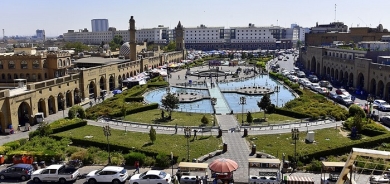U.S. warns against military action toward Iran, imposes no new sanctions on Tehran

The warning came days before a planned March 5 meeting between President Barack Obama and Israeli Prime Minister Benjamin Netanyahu.
“Any military action in that region threatens greater instability in the region,” said White House spokesman Jay Carney.
Israel has given mixed messages in recent weeks on the possibility it might attack Iran to halt its controversial nuclear development program.
Iran “borders both Afghanistan and Iraq,” Carney said during his daily press briefing. “We have civilian personnel in Iraq. We have military personnel as well as civilians in Afghanistan.”
So far, the United States has no conclusive evidence the Iranians are building a nuclear weapon, he said.
The Obama administration is advocating for a political solution to the crisis that includes International Atomic Energy Agency monitoring of Iran’s nuclear program.
“We continue to ratchet up the pressure on Tehran,” Carney said. “And I think it’s important to note that, while Tehran does not and has not lived up to its international obligations... we do have visibility into their programs.”
The Iranian government insists it is developing nuclear energy only for peaceful purposes, such as electrical generation and cancer treatment. The Iranians deny they plan to make nuclear weapons.
No clear evidence on Iran
The Israeli government has been vocal in contesting Iran’s claims that it seeks only peaceful use of nuclear energy.
Carney said the lack of evidence of Iranian nuclear weapons has given the United States the “time and latitude to continue the policy we have applied since the president took office.”
The policy has focused on isolating Iran, such as through economic sanctions, until its government gives up its nuclear program.
So far, Iranian President Mahmoud Ahmadinejad has said he plans to continue his country’s nuclear program. However, he has sent negotiators to discuss the issue with Western countries.
Iran’s nuclear program will be the “main topic” of discussion when Obama and Netanyahu meet at the White House Monday, according to the Israeli prime minister.
Obama’s pressure on the Israelis not to attack Iran has strained relations between the allies.
Netanyahu’s visit will be his first to the United States since he met with Obama in September.
No new sanctions
A congressional deadline for the Obama administration to begin enforcing new financial penalties on foreign firms that do business with Iran passed Wednesday with no fresh action from Washington.
While some congressional authors of a bill Obama signed December 31 expected the administration to announce new punishments on foreign banks, the Treasury Department said it did not have the authority to take that step now.
Top administration officials instead pointed to success in persuading friendly countries and financial institutions to cut ties with the Islamic republic on their own.
The legislation gave the administration 60 days to investigate private foreign financial institutions engaged in non-petroleum transactions with Iran's powerful Central Bank. That is a run up to heavier sanctions on Iran's lucrative oil business that take effect this summer.
Some in Washington expected Obama to strengthen his position ahead of the high-stakes meeting by announcing fresh economic penalties that went into effect Wednesday. The penalties were included in a law Obama signed on December 31.
But the administration chose not to immediately take action, and officials disagreed about when they could. A Treasury official said the administration has been identifying financial institutions that may be involved with transactions that could be sanctioned so they would be prepared to act following the deadline.
A senior Senate aide involved in Iran sanctions said that by not announcing new penalties Wednesday, the administration had failed to comply with the law as it was intended.
Both officials requested anonymity because they were not authorized to speak publicly.
In testimony on Capitol Hill and private negotiations with key allies around the world, Obama administration officials insisted sanctions already levied on Iran were working and that more economic pressure can thwart Tehran's disputed nuclear program.
Secretary of State Hillary Rodham Clinton told Congress the administration is having success in pushing U.S. allies to cut ties with Iran on their own rather than face American sanctions.
“We have faced some challenges because even some of our very best friends have to make serious adjustments in order to comply,” Clinton said. “But we’ve laid the groundwork so that they understand that ... this is an important international commitment and they're stepping up.”
The legislation said that “beginning on the date that is 60 days after the date of the enactment of this act, the president shall prohibit” any privately owned foreign financial institutions from engaging in significant non-oil transactions with Iran’s Central Bank. Oil sanctions would be added later under the same legislation.
(Reuters)














